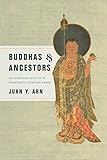Buddhas & ancestors [electronic resource] : religion and wealth in fourteenth-century Korea / Juhn Y. Ahn.
Material type: TextSeries: Korean studies of the Henry M. Jackson School of International Studies | Studies of the Weatherhead East Asian Institute, Columbia UniversityPublisher: Seattle : University of Washington Press, [2018]Description: 1 online resource ( xv, 243 pages)Content type:
TextSeries: Korean studies of the Henry M. Jackson School of International Studies | Studies of the Weatherhead East Asian Institute, Columbia UniversityPublisher: Seattle : University of Washington Press, [2018]Description: 1 online resource ( xv, 243 pages)Content type: - 9780295743400
- 0295743409
- Korea -- Religious life and customs
- Wealth -- Religious aspects -- Buddhism
- Wealth -- Religious aspects -- Confucianism
- Buddhism -- Korea -- Customs and practices
- Buddhist funeral rites and ceremonies -- Korea
- Confucianism -- Korea -- Customs and practices
- Funeral rites and ceremonies, Confucian -- Korea
- Korea -- Civilization -- 935-1392
- Corée -- Vie religieuse
- Richesse -- Aspect religieux -- Bouddhisme
- Richesse -- Aspect religieux -- Confucianisme
- Bouddhisme -- Corée -- Coutumes et pratiques
- Funérailles -- Rites et cérémonies bouddhiques -- Corée
- Confucianisme -- Corée -- Coutumes et pratiques
- Funérailles -- Rites et cérémonies confucéens -- Corée
- Corée -- Civilisation -- 935-1392
- RELIGION / Comparative Religion
- HISTORY / Asia / Korea
- Wealth -- Religious aspects -- Confucianism
- Wealth -- Religious aspects -- Buddhism
- Funeral rites and ceremonies, Confucian
- Confucianism -- Customs and practices
- Civilization
- Buddhist funeral rites and ceremonies
- Buddhism -- Customs and practices
- Korea
- Richesse -- Aspect religieux -- Confucianisme
- Richesse -- Aspect religieux -- Bouddhisme
- Rites et ceremonies funeraires -- Coree -- 14e siecle
- Coree -- Civilisation -- 935-1392
- 935-1392
- 294.309519/09023 23
- BL2236.R58 A39 2018
- online - EBSCO
| Item type | Current library | Call number | URL | Status | Notes | Barcode | |
|---|---|---|---|---|---|---|---|
 eBook
eBook
|
Biblioteca "Angelicum" Pont. Univ. S.Tommaso d'Aquino Nuvola online | online - EBSCO (Browse shelf(Opens below)) | Online access | Not for loan (Accesso limitato) | Accesso per gli utenti autorizzati / Access for authorized users | (ebsco)1817092 |
Includes bibliographical references and index.
Description based on online resource; title from digital title page (viewed on July 02, 2018).
Introduction -- Sowing the seeds of salvation with wealth -- Dark and mysterious ways -- This way of ours -- All the king's men -- Buddhas and ancestors -- Conclusion -- Notes -- Glossary of Chinese characters -- Bibliography -- Index.
Two issues central to the transition from the Kory to the Chos n dynasty in fourteenth-century Korea were social differences in ruling elites and the decline of Buddhism, which had been the state religion. In this revisionist history, Juhn Ahn challenges the long-accepted Confucian critique that Buddhism had become so powerful and corrupt that the state had to suppress it. When newly rising elites (many with strong ties to the Mongols) used lavish donations to Buddhist institutions to enhance their status, older elites defended their own adherence to this time-honored system by arguing that their donations were linked to virtue. This emphasis on virtue and the consequent separation of religion from wealth facilitated the Confucianization of Korea and the relegation of Buddhism to the margins of public authority during the Chos n dynasty.


